波斯湾阿拉伯国家
波斯湾阿拉伯国家由两王国(巴林和沙特)、一苏丹国(阿曼)及三酋长国(科威特、卡塔尔和阿联酋)所组成。 该六国同时是海湾阿拉伯国家合作委员会成员。该地区有阿拉伯国家联盟七个成员国:巴林、科威特、伊拉克、阿曼、卡塔尔、沙特阿拉伯和阿联酋。[1][2][3]
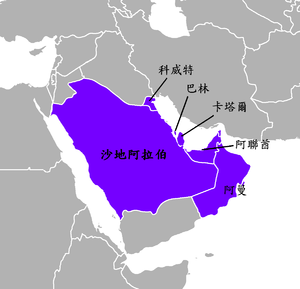
这个词在不同的上下文中被用来指该地区的一些阿拉伯国家。著名的地区政治联盟海湾合作委员会,包括巴林、科威特、阿曼、卡塔尔、沙特阿拉伯和阿联酋。[4][5][6]历史上,大英帝国统治下的波斯湾国家[7][8][9] 和最终形成阿拉伯联合酋长国的停战诸国。[10][11][12]
| 国旗 | 国徽 | 国名 | 官方名称 | 政治体制 | |
|---|---|---|---|---|---|
| 英语名称 | 标准阿拉伯语名称 | ||||
 |
 |
巴林王国 | Kingdom of Bahrain | Mamlakat al-Baḥrayn | 君主专制 |
 |
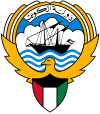 |
科威特国 | State of Kuwait | Dawlat al-Kuwayt | 二元制君主立宪制 世袭君主制 |
 |
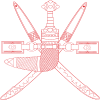 |
阿曼苏丹国 | Sultanate of Oman | Saltanat ʻUman | 君主专制 |
| 卡塔尔国 | State of Qatar | Dawlat Qaṭar | 君主专制 | ||
 |
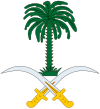 |
沙特阿拉伯王国 | Kingdom of Saudi Arabia | Al-Mamlaka al-ʻArabiyya as-Suʻūdiyya | 君主专制 |
 |
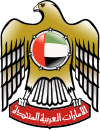 |
阿拉伯联合酋长国 | United Arab Emirates | Al-Imārāt al-‘Arabīyah al-Muttaḥidah | 联邦君主制a |
| a 其政体是事实上而非法律上。 | |||||
由于波斯湾阿拉伯国家的经济结构及文化相似,很多时会作为一个整体来讨论。
2017年6月5日,巴林突然宣布与被指支持恐怖组织的卡塔尔断交,其后沙特阿拉伯、阿联酋等六个国家亦宣布与卡塔尔断交且封闭海陆空交通,导致卡塔尔陷入外交危机,此危机直至2021年1月5日方告解除。
经济
编辑石油和天然气是波斯湾阿拉伯国家的主要收入来源。由于人口相对稀少,使当地的人均收入较相邻地区高。为应付劳工短缺问题,该地区从南亚(主要是印度)和东南亚(主要是菲律宾和印尼)引入大量非移民临时劳工;以往主要引入约旦(大部分为巴勒斯坦人)和埃及劳工。
采珠和珍珠业曾是该地区(尤其是巴林、卡塔尔和科威特)的主要经济活动,但已随着日本等地的养珠业在1930年代起盛行而衰落。
文化
编辑波斯湾阿拉伯国家的文化相似,被称作khaleeji(海湾)文化。居民使用阿拉伯语,也有类似的音乐特色(sawt、fijiri、ardha、liwa等)、食物、服饰等。大部分居住波斯湾的阿拉伯人的祖先均来自各阿拉伯部落。
该六国均为世袭君主制,几乎没有代议政制。只有巴林王国和科威特国的议会有民选代表。沙特阿拉伯和卡塔尔是自1932年和1971年各自建国以来从未举行过选举并实行君主专制的两个阿拉伯国家。[13]
外部阅读
编辑- 波斯湾阿拉伯国家历史 (页面存档备份,存于互联网档案馆)
- J. E. Peterson (1998), The Arab Gulf States: Steps Toward Political Participation, ISBN 0-275-92881-0
- Anoushiravan Ehteshami and Steven Wright (2007), Reform in the Middle East Oil Monarchies, ISBN 978-0863723230
- F. Gregory, III Gause (1994), Oil Monarchies: Domestic and Security Challenges in the Arab Gulf States, ISBN 0-87609-151-6
- Atif A. Kubursi (1984), Oil, Industrialization and Development in the Arab Gulf States, ISBN 0-7099-1566-7
- Gordon Robison (1996), Lonely Planet: Arab Gulf States, ISBN 0-86442-390-X
参阅
编辑- ^ Mary Ann Tétreault; Gwenn Okruhlik; Andrzej Kapiszewski. Political Change in the Arab Gulf States: Stuck in Transition. 2011 [2021-10-18]. (原始内容存档于2021-12-22).
作者首先关注七个海湾国家的政治:巴林、伊拉克、科威特、阿曼、卡塔尔、沙特阿拉伯和阿联酋。
- ^ World Migration 2005 Costs and Benefits of International Migration. International Organization for Migration. 2005: 53 [2021-10-18]. ISBN 9788171885503. (原始内容存档于2021-11-21).
- ^ U.S. Official to Tour Persian Gulf Arab Lands. The New York Times. 1987 [2021-10-18]. (原始内容存档于2021-12-13).
A leading American diplomat will start a trip to Iraq and six other Arab countries of the Persian Gulf region this week to discuss the Iran-Iraq war, Administration officials said today.
- ^ Hertog, Steffen. Arab Gulf States : an assessment of nationalisation policies. 2014 [12 May 2021]. (原始内容存档于2021-10-18).
- ^ Peterson, J. E. Life after Oil: Economic Alternatives for the Arab Gulf States. Duke University Press. 2009 [13 May 2021].
- ^ Gulf countries. European Commission. [13 May 2021]. (原始内容存档于2021-11-21).
海湾合作委员会国家——巴林、科威特、阿曼、卡塔尔、沙特阿拉伯和阿联酋——是欧盟农产品出口的重要市场。
- ^ Onley, James. Britain and the Gulf Shaikhdoms, 1820-1971: The Politics of Protection. CIRS Occasional Papers. 2009 [16 May 2021].[失效链接]
- ^ Watt, D. C. Britain and the Future of the Persian Gulf States. The World Today (Royal Institute of International Affairs). 1964, 20 (11): 488–496 [16 May 2021]. (原始内容存档于2021-10-22).
- ^ Albaharna, Husain. The Legal Status of the Arabian Gulf States. A Study of their Treaty Relations and their International Problems. International & Comparative Law Quarterly (Manchester University Press). April 1969, 18 (2): 518 – 519 [12 May 2021]. (原始内容存档于2021-11-21).
- ^ Bey, Frauke. From Trucial States to United Arab Emirates. UK: Longman. 1996: 296–297. ISBN 978-0-582-27728-1.
- ^ Balfour-Paul, G., The End of Empire in the Middle East: Britain's Relinquishment of Power in her Last Three Arab Dependencies, Cambridge University Press, 1984, ISBN 978-0-521-46636-3
- ^ Barnwell, Kristi Nichole. From trucial states to nation state : decolonization and the formation of the United Arab Emirates, 1952-1971. The University of Texas at Austin. 2011 [16 May 2021]. (原始内容存档于2021年11月21日).
对于波斯湾阿拉伯酋长国的统治者来说,威尔逊的宣布标志着英国军事保护的结束,也标志着最终导致1971年12月3日阿拉伯联合酋长国成立的谈判进程的开始。对波斯湾各个国家成为主权联邦的过程进行考察,提供了一个考察民族主义和反帝国主义在联盟建立中所起作用的机会。
- ^ Robbers, Gerhard. Encyclopedia of world constitutions, Volume 1. 2007: 791. ISBN 978-0-8160-6078-8.